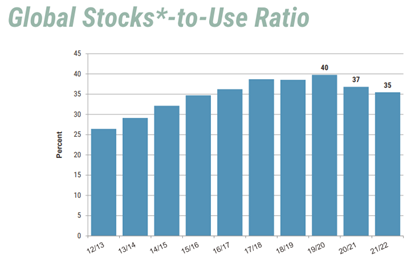USDA’s August 2021 World Supply & Demand Estimates (WASDE) report trimmed expected global wheat production, reduced the global wheat stocks-to-use ratio and created a supply shock market rally. USDA dropped total production to 777 million metric tons (MMT), 15.4 MMT less than its July forecast, citing major weather problems in Russia, Canada and the United States. Global wheat use forecast for 2021/22 is 787 MMT.
Wheat supply is of course a major variable in global price discovery and is related to the “stocks-to-use” ratio, representing the level of carryover stocks as a percentage of the total demand or use. These new USDA estimates reduced the global stocks-to-use forecast to 35%, which, if realized will be its lowest since 2016/17. If China’s massive wheat stocks are removed from the calculation (China exports very little wheat), the stocks-to-use estimate is 21.6%.

Guy Allen, Senior Economist at IGP Institute at Kansas State University, points out that an important consideration when looking at the wheat stocks-to-use ratio is to compare the ratio to corn as well. While wheat is primarily a food grain, it can compete with feed grains given relative prices or regional shortages. The current global stocks-to-use ratio forecast for corn is 24%, also lower than its ratio the past few years.
Supply Shock Source
How did the world get to this point? Global use continues to set records each year and ending stocks declined in 2020/21 and again this marketing year. It is major exporting countries taking the supply hit this year. In fact, Stratégie Grains, a French grains analyst, said that the stocks-to-use ratio for major exporting countries could fall to its second-lowest level on record after 2012/13.
USDA slashed Russia’s production forecast 12.5 MMT to 72.5 MMT. The Russian statistical agency, Rosstat, reduced the number of winter wheat acres harvested while the Ministry of Agriculture reported lower yields. In Canada, the Prairie Provinces saw production decline after persistent drought slashed yields by 24% compared to the 5-year average. USDA reduced its Canadian production forecast by 32% compared to 2020/21 to 24.0 MMT. If realized, it will be the smallest Canadian wheat crop since 2010/11.
U.S. Wheat Balance Sheet
USDA also lowered U.S. production 7% compared to last year as drought has affected several wheat-growing areas including the Northern Plains states and the Pacific Northwest (PNW). The total stocks-to-use ratio in the U.S. is forecast at 30% for 2021/22, down 10% from 2020/21’s total stocks-to-use ratio of 40%. This is not surprising considering that all wheat classes started with lower beginning stocks in 2021/22 and of the five wheat classes tracked by the USDA in its monthly report all wheat classes except for hard red winter (HRW) and soft red winter (SRW) are expected to have lower ending stocks. Even with the higher production in HRW and SRW, the stocks-to-use ratio is forecast lower for all wheat classes in 2021/22. U.S. white wheat, primarily soft white grown in the Pacific Northwest (PNW) is the most affected with 16% stocks-to-use compared to 21% last year.

With harvest well underway for many classes (HRS, S.W.) and complete for HRW and SRW the market is getting a better indication of how accurate the USDA’s production number is. The September WASDE report will account for more known production in the United States and other major exporting countries. USDA will also publish its quarterly Grain Stocks report at the end of September that will also add to our understanding of how much wheat is available.
By USW Market Analyst Michael Anderson


